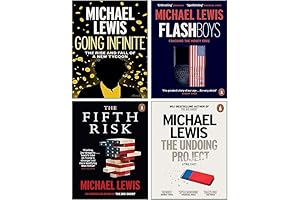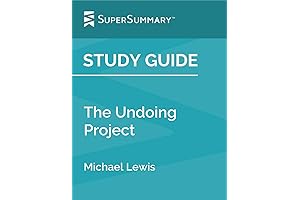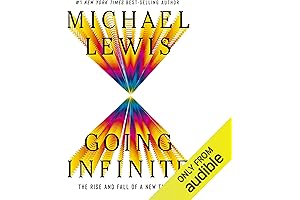· decision making and amp problem solving · 12 min read
The Undoing Project: An Unforgettable Friendship That Changed the Way We Think
Delve into the captivating story of The Undoing Project, a powerful tale of friendship and intellectual collaboration that reshaped our understanding of decision-making and judgment.
Embark on a captivating journey into The Undoing Project, a non-fiction masterpiece by Michael Lewis. This groundbreaking work unravels the remarkable friendship between Amos Tversky and Daniel Kahneman, two brilliant cognitive psychologists and Nobel laureates. Together, they revolutionized our understanding of decision-making, biases, and the often irrational ways our minds work.
Overview

PROS
- Unveils the remarkable friendship between Daniel Kahneman and Amos Tversky, two Nobel laureates who revolutionized behavioral economics.
- Explores their groundbreaking research on cognitive biases and heuristics, offering valuable insights into human decision-making.
- Presents a fascinating narrative that delves into the personal and professional lives of these brilliant minds.
- Provides a comprehensive overview of their key contributions to the field, including prospect theory and loss aversion.
CONS
- Some readers may find the technical details of their research challenging to follow.
- The focus on the personal relationship between Kahneman and Tversky may overshadow the scientific content for some.
The Undoing Project: A Friendship That Changed Our Minds is a captivating exploration of the extraordinary friendship and groundbreaking collaboration between Daniel Kahneman and Amos Tversky. Michael Lewis, a renowned journalist, takes us on an enthralling journey into the minds of these two Nobel laureates who revolutionized behavioral economics.
Lewis masterfully weaves together personal anecdotes and scientific rigor to present a compelling narrative that unveils the key contributions of Kahneman and Tversky to our understanding of decision-making. The book delves into their groundbreaking research on cognitive biases, heuristics, and prospect theory, offering valuable insights into the often irrational and unpredictable nature of human choices.

PROS
- Unveils complex financial concepts through captivating storytelling.
- Provides deep insights into the human psyche and decision-making processes.
CONS
- May require some background knowledge in economics or finance.
- Some readers may find the technical details overwhelming.
Immerse yourself in the captivating world of finance and human behavior with this extraordinary collection of four masterpieces by acclaimed author Michael Lewis. 'Going Infinite' takes you on a thrilling ride into the high-stakes realm of Wall Street, where brilliance and recklessness collide.
In 'The Undoing Project,' Lewis unravels the groundbreaking work of behavioral economists Daniel Kahneman and Amos Tversky, revealing the hidden biases and cognitive limitations that shape our decision-making. 'Flash Boys' exposes the high-speed, cutthroat world of electronic trading, shedding light on the hidden advantage held by a select few. Finally, 'The Fifth Risk Undoing Democracy' offers a sobering examination of the fragility of our institutions and the threats facing democracy in the age of technology. Each book is a tour de force, meticulously researched and brilliantly written, offering a profound understanding of the forces that drive our economy and society. Whether you're a seasoned investor, a budding economist, or simply fascinated by the human condition, this collection is an invaluable addition to your library.
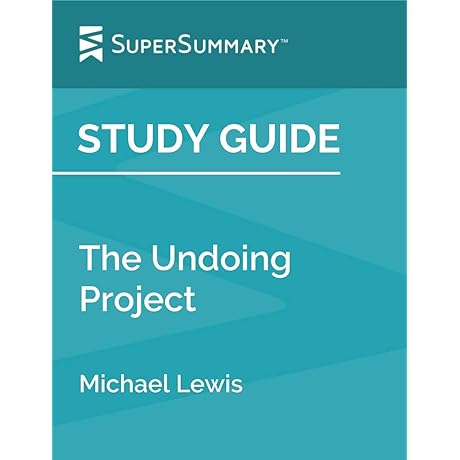
PROS
- Comprehensive summary of Michael Lewis's The Undoing Project
- In-depth analysis of behavioral economics concepts
- Clear explanations and engaging writing style
CONS
- May not provide enough original content for advanced readers
Delve into the fascinating world of behavioral economics with this in-depth study guide to Michael Lewis's acclaimed book, The Undoing Project. This comprehensive study guide unravels the groundbreaking research of Daniel Kahneman and Amos Tversky, illuminating the cognitive biases and heuristics that influence our decision-making.
Written with clarity and precision, this guide not only summarizes the key concepts from Lewis's book but also provides valuable insights and analysis. The authors delve into the experiments and case studies that shaped Kahneman and Tversky's theories, offering a deeper understanding of their revolutionary work. This guide is an essential resource for students, researchers, and anyone seeking a deeper understanding of behavioral economics.
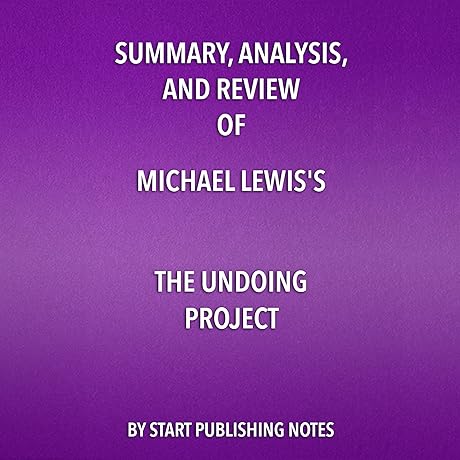
PROS
- Provides a comprehensive overview of the key concepts in Michael Lewis's The Undoing Project.
- Offers insightful analysis of the friendship and collaboration between Daniel Kahneman and Amos Tversky.
CONS
- May be too technical for readers without a background in behavioral economics.
- Lacks practical applications of the concepts discussed in the book.
In this thought-provoking summary and analysis, we delve into Michael Lewis's captivating book, The Undoing Project, which chronicles the extraordinary friendship and collaboration between Daniel Kahneman and Amos Tversky, two groundbreaking behavioral economists. Lewis masterfully weaves together their personal stories with an exploration of their groundbreaking research on cognitive biases and decision-making.
The review offers a comprehensive overview of the key concepts introduced in The Undoing Project, such as prospect theory, framing effects, and heuristics. Lewis's analysis delves into the implications of their work for our understanding of human behavior and decision-making processes. Moreover, the review highlights the profound impact of Kahneman and Tversky's friendship on their intellectual journey and the development of behavioral economics as a field.

PROS
- Succinctly summarizes the key concepts of the book
- Provides insightful analysis of the friendship between Kahneman and Tversky
CONS
- May be too brief for some readers
- Lacks original insights beyond the source material
Instaread’s Summary, Analysis & Review of The Undoing Project by Michael Lewis offers a comprehensive overview of the groundbreaking work of Daniel Kahneman and Amos Tversky. The summary succinctly captures the essence of the book, highlighting the key insights into cognitive biases and decision-making.
The analysis delves deeper into the friendship between Kahneman and Tversky, exploring how their collaboration shaped their research and the field of behavioral economics. The review provides valuable insights into the implications of their work for investors, marketers, and policymakers alike.

PROS
- A well-written and engaging narrative that brings the complex world of behavioral economics to life.
- Provides a fascinating look at the lives and work of two of the most influential economists of the 20th century.
CONS
- Some readers may find the book's focus on the personal lives of Kahneman and Tversky distracting.
- The book's technical detail could be challenging for readers who are not familiar with economics.
The Undoing Project is a masterful book that tells the story of the partnership between Daniel Kahneman and Amos Tversky, two of the most influential economists of the 20th century. Lewis's writing is clear, engaging, and witty, and he does an excellent job of explaining complex economic concepts in a way that is accessible to general readers. The book is full of fascinating insights into the human mind and how we make decisions.
One of the most striking things about The Undoing Project is the way that it combines intellectual history with personal biography. Lewis tells the story of Kahneman and Tversky's partnership against the backdrop of the tumultuous events of the 1960s and 1970s. The book provides a fascinating glimpse into the lives of two brilliant men who were both deeply flawed and profoundly human.

PROS
- In-depth exploration of the factors that make teams successful.
- Fascinating case studies of iconic teams across various industries.
CONS
- May be too specific for readers who are not interested in team dynamics.
- Some readers may find the focus on specific teams limiting.
Michael Lewis's Playing to Win is a captivating exploration of the elements that contribute to the success of high-performing teams. Through detailed case studies of renowned teams, Lewis unveils the common threads that distinguish exceptional performers from the rest.
One of the strengths of this book is its in-depth analysis of team dynamics. Lewis delves into the psychological factors and organizational structures that shape team behavior and performance. He provides practical insights and actionable strategies that readers can use to enhance their own team's effectiveness.
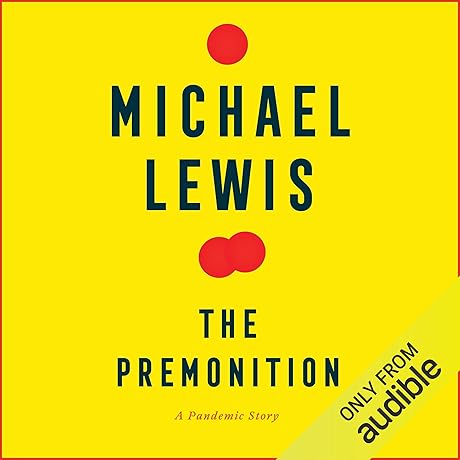
PROS
- A fascinating and thought-provoking look at the history of behavioral economics.
- Lewis's writing is engaging and accessible, making complex economic concepts easy to understand.
- The book offers a unique perspective on the global financial crisis and the challenges facing the world today.
CONS
- The book is quite long and some readers may find it slow-paced at times.
- Lewis's focus on his own relationship with Kahneman and Tversky can be a bit distracting at times.
The Undoing Project is a fascinating and thought-provoking look at the history of behavioral economics. Michael Lewis tells the story of his friendship with two behavioral economists, Daniel Kahneman and Amos Tversky, who would transform the world of economics. Lewis's writing is engaging and accessible, making complex economic concepts easy to understand. The book offers a unique perspective on the global financial crisis and the challenges facing the world today.
The Undoing Project is a must-read for anyone interested in economics, psychology, or human behavior. Lewis's engaging writing style and insightful analysis make this book a pleasure to read. The book is filled with fascinating stories and anecdotes that illustrate the power of behavioral economics. Lewis also provides a clear and concise explanation of the key concepts of behavioral economics, making this book a great introduction to the field for those who are new to it.
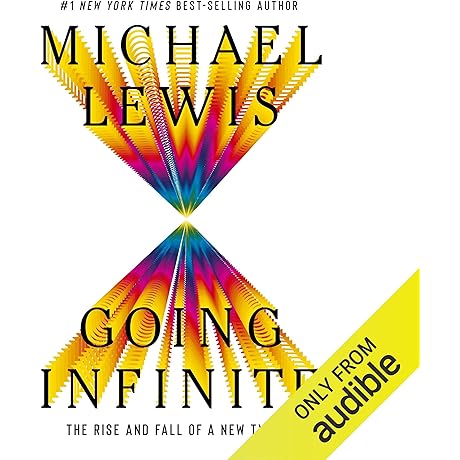
PROS
- Offers a detailed account of the rise and fall of Theranos' founder, Elizabeth Holmes.
- Uncovers the complex factors that contributed to the company's spectacular failure.
CONS
- Some readers may find the level of detail overwhelming.
- The book's focus on Theranos may not appeal to readers unfamiliar with the company.
In 'Going Infinite,' journalist Michael Lewis recounts the meteoric rise and spectacular fall of Theranos, a Silicon Valley startup founded by Elizabeth Holmes. Lewis paints a vivid picture of Holmes, a charismatic and ambitious entrepreneur who convinced investors and the media alike that Theranos was on the cusp of revolutionizing the healthcare industry with its groundbreaking blood-testing technology. However, as Lewis reveals, Holmes's claims were built on a foundation of exaggeration and lies, and Theranos's technology never lived up to its hype.
Lewis's book is a fascinating and cautionary tale of how unchecked ambition and greed can lead to disaster. He provides a detailed account of Theranos's early successes and the factors that contributed to its eventual downfall. Lewis also explores the role of investors, regulators, and the media in enabling Theranos to flourish for as long as it did. 'Going Infinite' is a must-read for anyone interested in the inner workings of Silicon Valley and the dangers of unchecked ambition.

PROS
- This collection showcases Lewis's unique blend of financial expertise and storytelling prowess.
- An essential reading list for understanding the complexities of modern finance and politics.
CONS
- Some readers may find occasional slow-paced sections while diving into certain financial jargons.
Immerse yourself in the captivating world of finance and politics with this exceptional collection by Michael Lewis. This set of three compelling narratives, 'The Undoing Project,' 'Flash Boys,' and 'The Fifth Risk,' offers a unique perspective on some of the most significant events shaping our world.
In 'The Undoing Project,' witness the unbreakable bond between Israeli psychologists Daniel Kahneman and Amos Tversky as they revolutionize the field of behavioral economics. 'Flash Boys' exposes the rigged stock market system, uncovering the manipulation that undermines fair play. Finally, 'The Fifth Risk' paints an alarming picture of a government unprepared for potential crises. Michael Lewis's astute observations and masterful storytelling make each book a thought-provoking and unforgettable experience.
The Undoing Project meticulously reconstructs the life-long partnership between Kahneman and Tversky, shedding light on their groundbreaking research into heuristics and biases. Lewis's vivid storytelling brings to life their fascinating experiments and thought-provoking insights, revealing the profound impact their collaboration had on fields ranging from economics and finance to psychology and law.
Frequently Asked Questions
What is the central theme of The Undoing Project?
The Undoing Project delves into the nature of human judgment and decision-making, exploring the often irrational and emotional factors that influence our choices.
Who are the main protagonists in the book?
The book centers around the extraordinary friendship and intellectual partnership between Amos Tversky and Daniel Kahneman, two renowned cognitive psychologists and Nobel laureates.
What are some of the key takeaways from The Undoing Project?
The book highlights the fallibility of human judgment, the power of heuristics and biases, and the importance of understanding these cognitive limitations in improving decision-making.
Is The Undoing Project a challenging read?
While The Undoing Project delves into complex psychological concepts, Lewis's engaging writing style makes it accessible to a wide audience, including those without a background in psychology or economics.
What is the significance of The Undoing Project in the field of psychology?
The Undoing Project serves as a seminal work in behavioral economics and psychology, having a profound influence on our understanding of how individuals make decisions under uncertainty and the presence of cognitive biases.

